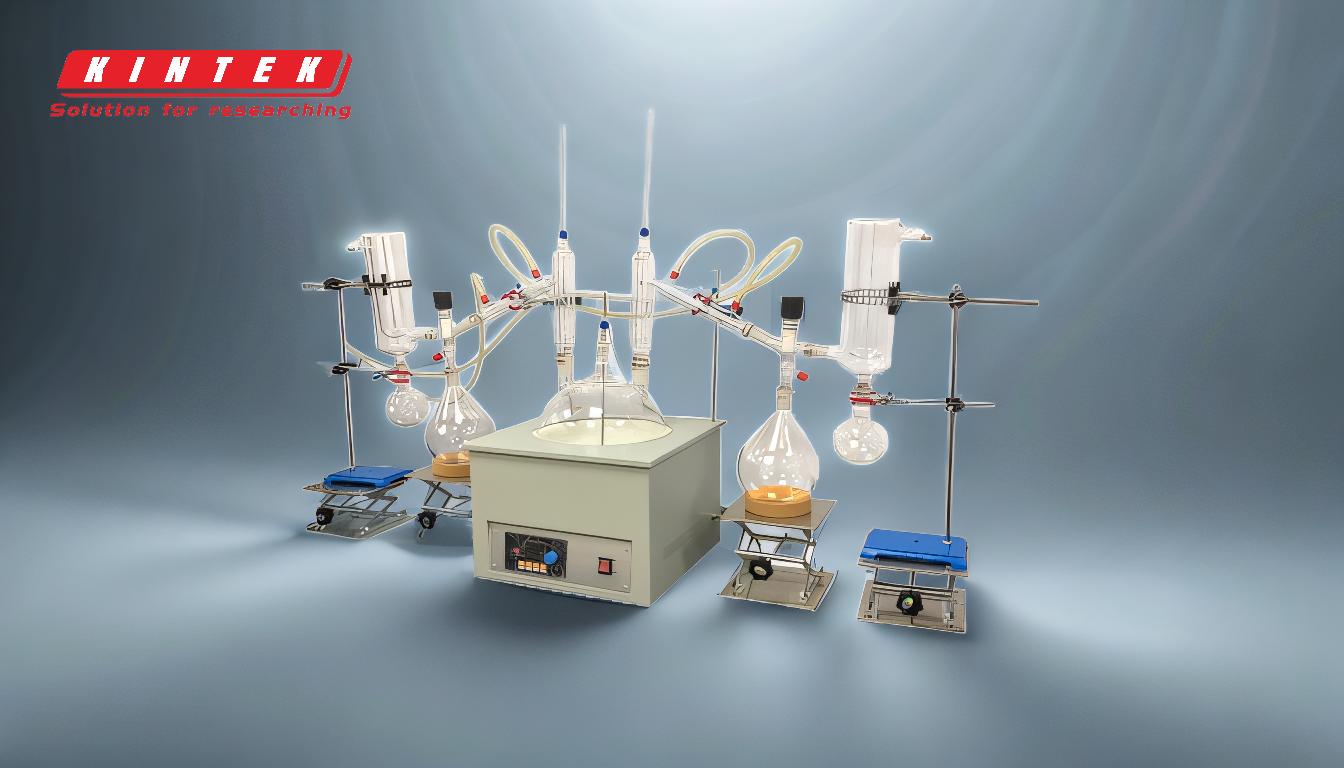Vacuum distillation is a widely used technique in various industries, including cannabis processing, desalination, and chemical manufacturing. It involves reducing the pressure within the distillation system to lower the boiling points of compounds, enabling distillation at lower temperatures. This method offers several advantages, such as preventing thermal degradation of temperature-sensitive compounds, improving purity, and reducing capital costs for equipment. However, it also has some disadvantages, including higher operating costs and the need for specialized equipment to maintain vacuum conditions. Below, we explore the key advantages and disadvantages of vacuum distillation in detail.
Key Points Explained:

-
Advantages of Vacuum Distillation:
-
Lower Boiling Points for Temperature-Sensitive Compounds:
- By reducing the pressure, vacuum distillation lowers the boiling points of liquids, allowing distillation to occur at lower temperatures. This is particularly beneficial for heat-sensitive compounds, such as cannabinoids in cannabis distillation, which can degrade or combust at higher temperatures.
- Example: In cannabis processing, vacuum distillation ensures high-purity THC without thermal degradation.
-
Prevention of Thermal Degradation:
- The reduced temperature minimizes the risk of unwanted chemical reactions, such as polymerization or decomposition, which can occur at higher temperatures.
- Example: In industrial applications, vacuum distillation prevents product degradation and polymer formation.
-
Improved Purity and Yield:
- The process allows for the separation of compounds with close boiling points, resulting in higher purity and yield. This is especially useful in industries like pharmaceuticals and chemicals.
- Example: Industrial-scale vacuum distillation increases capacity and purity while reducing the number of equilibrium stages required.
-
Cost-Effectiveness in Equipment Design:
- Vacuum distillation can reduce the height and diameter of distillation columns, lowering capital costs for equipment.
- Example: Smaller columns are more economical to construct and install.
-
Energy Efficiency:
- Lower operating temperatures reduce energy consumption compared to traditional distillation methods.
- Example: In desalination, vacuum distillation is an energy-efficient way to produce fresh water from seawater.
-
Versatility and Adaptability:
- Vacuum distillation systems can be easily modified to suit different processes and compounds.
- Example: Mini rotary evaporators use vacuum distillation for efficient extraction and distillation of various substances.
-
Lower Boiling Points for Temperature-Sensitive Compounds:
-
Disadvantages of Vacuum Distillation:
-
Higher Operating Costs:
- Maintaining a vacuum requires specialized equipment, such as vacuum pumps, which can increase operating costs.
- Example: The need for continuous vacuum maintenance can lead to higher energy and maintenance expenses.
-
Complexity of Equipment:
- Vacuum distillation systems are more complex than traditional distillation setups, requiring precise control of pressure and temperature.
- Example: Industrial-scale vacuum distillation systems need advanced monitoring and control systems.
-
Risk of Contamination:
- The reduced pressure can sometimes lead to contamination from volatile impurities or leaks in the system.
- Example: In pharmaceutical applications, even minor contamination can compromise product quality.
-
Limited Scalability for Small-Scale Applications:
- While vacuum distillation is highly effective for industrial-scale processes, it may not be as cost-effective or practical for small-scale applications.
- Example: Small laboratories may find it challenging to justify the cost and complexity of vacuum distillation equipment.
-
Potential for Foaming and Entrainment:
- The reduced pressure can cause foaming or entrainment of liquids, leading to inefficiencies in the distillation process.
- Example: In chemical processing, foaming can reduce the efficiency of separation and increase the risk of product loss.
-
Higher Operating Costs:
-
Applications of Vacuum Distillation:
-
Cannabis and Pharmaceutical Industries:
- Used to extract and purify temperature-sensitive compounds like THC and other cannabinoids without degradation.
-
Desalination:
- Efficiently removes salt from seawater to produce fresh water.
-
Chemical Manufacturing:
- Separates and purifies chemicals with close boiling points, ensuring high-purity end products.
-
Laboratory Research:
- Mini rotary evaporators and short-path distillation systems are used for small-scale extraction and purification.
-
Cannabis and Pharmaceutical Industries:
In conclusion, vacuum distillation offers significant advantages, particularly for temperature-sensitive compounds and industrial-scale applications. However, it also comes with challenges, such as higher operating costs and equipment complexity. Understanding these trade-offs is essential for selecting the appropriate distillation method for specific applications.
Summary Table:
| Aspect | Advantages | Disadvantages |
|---|---|---|
| Temperature Control | Lowers boiling points, prevents thermal degradation | Higher operating costs due to specialized equipment |
| Purity & Yield | Improves separation of compounds with close boiling points | Risk of contamination from volatile impurities |
| Equipment Design | Reduces capital costs with smaller distillation columns | Increased complexity and need for precise control systems |
| Energy Efficiency | Lower operating temperatures reduce energy consumption | Limited scalability for small-scale applications |
| Versatility | Easily adaptable for various processes and compounds | Potential for foaming and entrainment, reducing efficiency |
Need help choosing the right distillation method for your application? Contact our experts today for personalized advice!











